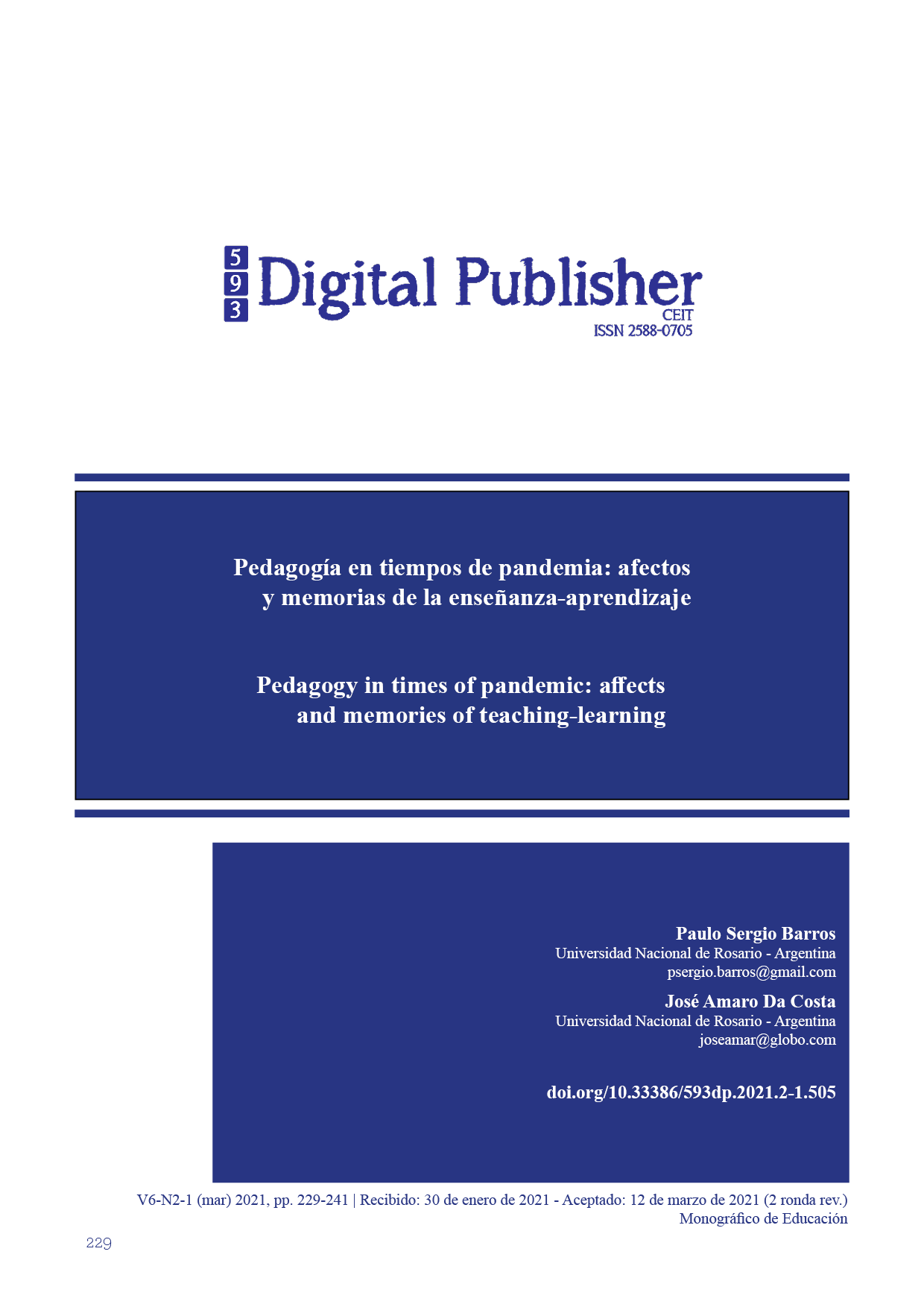Pedagogy in times of pandemic: affects and memories of teaching-learning
Main Article Content
Abstract
This article discusses conceptual and practical aspects of virtual education in quarantine times, based on the Brazilian reality, taking as a backdrop reflections on education and the authors' teaching practices in the context of a historical and educational reality marked by a pandemic. In this way, the text highlights the pandemic as a historical event full of sensitive issues that affect different aspects of society and, consequently, in the educational sphere, demanding from education a more attentive reflection of aspects such as technology, remote education, teaching-learning, emotions and affectivity.
Downloads
Article Details

This work is licensed under a Creative Commons Attribution-NonCommercial-ShareAlike 4.0 International License.
1. Derechos de autor
Las obras que se publican en 593 Digital Publisher CEIT están sujetas a los siguientes términos:
1.1. 593 Digital Publisher CEIT, conserva los derechos patrimoniales (copyright) de las obras publicadas, favorece y permite la reutilización de las mismas bajo la licencia Licencia Creative Commons 4.0 de Reconocimiento-NoComercial-CompartirIgual 4.0, por lo cual se pueden copiar, usar, difundir, transmitir y exponer públicamente, siempre que:
1.1.a. Se cite la autoría y fuente original de su publicación (revista, editorial, URL).
1.1.b. No se usen para fines comerciales u onerosos.
1.1.c. Se mencione la existencia y especificaciones de esta licencia de uso.
References
Almeida, L. R. (2007). A dimensão afetiva e o processo ensino-aprendizagem. En A. A. Mahoney. (coord.), Afetividade e aprendizagem: contribuições de Henri Wallon (pp. 13-24). São Paulo: Ed. Loyola.
Andrade, J. A., Gil, C. Z. V., y Balestra, J. P. (2018). Ensino de História, direitos humanos e temas sensíveis. Revista História Hoje, 7(13), 4–13. doi: https//10.20949/rhhj.v7i13.458.
Boff, L. (1999). Saber cuidar. Petrópolis: Vozes.
Durães, S. J. A. (2011). Aprendendo a ser professor(a) no século XIX: algumas influências de Pestalozzi, Froebel e Herbart. Educação e Pesquisa, 37 (3), 465-480. doi: https://doi.org/10.1590/S1517-97022011000300002
Freire, P. (1996). Pedagogia da Autonomia: saberes necessários à prática educativa. 36 ª ed. São Paulo: Paz e Terra.
Gil, C. Z. V., y Camargo, J. (2018). Ensino de história e temas sensíveis: abordagens
teórico-metodológicas. Revista História Hoje, 7(13), 139-159. doi: https//10.20949/rhhj.v7i13.430
Harari, Y. N. (20 de marzo de 2020). Yuval Noah Harari: the world after coronavirus. Financial Times. Recuperado de https://cutt.ly/IlZP7hL
Hooks, B. (2018). Ensinando a transgredir: a educação como prática de liberdade. Martins Fontes: São Paulo.
Jares, X. R. (2008). Pedagogia da convivência. 1ª ed. São Paulo: Palas Athena.
Jung, C. G. (2008). O homem e seus símbolos. 2ª ed. Rio de Janeiro: Nova Fronteira.
Gonfiantini, V. (2019). Complejidad, ética y educación: reflexiones para repensar nuestras construcciones metodológicas. 1ª ed. Rosario: Laborde Editor.
López, L. (2020). Educación remota de emergencia, virtualidad y desigualdades: pedagogía en tiempos de pandemia. 593 Digital Publisher CEIT, 5(5-2), 98-107. doi: https://doi.org/10.33386/593dp.2020.5-2.347
Maturana, H. (2001). Emociones y lenguaje en educación y política. 10ª ed. Palma de Mallorca: Ed. Dolmen Ensayo.
Mendes, D. B. (2017). Memórias afetivas: a constituição do professor na perspectiva de Henri Wallon. 1ª ed. São Paulo: Ed. Loyola.
Moreira, A. F. B., Kramer, S. (2007). Contemporaneidade, educação e tecnologia. Educação e Sociedade 28 (100), 1037-1057. doi: https://doi.org/10.1590/S0101-73302007000300019
Morin, E. (2001). Os sete saberes necessários à educação do futuro. 3ª ed. São Paulo: Cortez; Brasília: Unesco.
Morin, E. (2011). La vía: para el futuro de la humanidad. Barcelona: Paidós.
Morin, E. Edgar. [edgarmorinparis] (13 jul. 2020). Le virus (Coranavirus) nous rapelle à notre humanité. [Tuit]. Recuperado de: https://twitter.com/edgarmorinparis/status/1282601923951104001.
Neira, M., y Pulgarin, E. (2021). La Innovación educativa como herramienta pedagógica en el proceso de enseñanza-aprendizaje en tiempos de pandemia de la Unidad Educativa Fiscal José Jesús Ocampo Salazar. 593 Digital Publisher CEIT, 6(1), 96-120. doi: https://doi.org/10.33386/593dp.2021.1.425
Novais, E. L. (2016). A crise de paradigmas na escola atual: uma escola moderna em um mundo pós-moderno. Cadernos da Educação Básica, 1,(2), 116-133.
doi: http://dx.doi.org/10.33025/ceb.v1i2.800
Rajobac, R. (2016). Bildung enquanto formação estética no jovem Nietzsche. 1ª ed. Porto Alegre: EDIPUCRS.
Ratier, R. (2019). Escola e afetos: um elogio da raiva e da revolta. En F. Cássio. (coord.), Educação contra a barbárie (pp. 151-157). São Paulo: Boitempo.
Santos, B. S. (2020a). Vírus: tudo que é sólido desmancha no ar. En A. Tostes y H. Melo Filho, (coords.), Quarentena: reflexões sobre a pandemia e depois (pp. 45-49). Bauru, SP: Canal6 Editora.
Santos. B. S (2020b). A cruel pedagogia do vírus. Coimbra: Edições Almedina.
Tijiboy, A.V. (2001). As novas tecnologias e a incerteza na educação. En M. L. Silva (coord.), Novas tecnologias: educação e sociedade na era da informação (pp. 39-56). Belo Horizonte: Autêntica.
Tillman, D., y Colomina, P. Q. (2003). LVEP Educator Training Guide. 1ª ed. New Delhi: Publisher Sterling.



